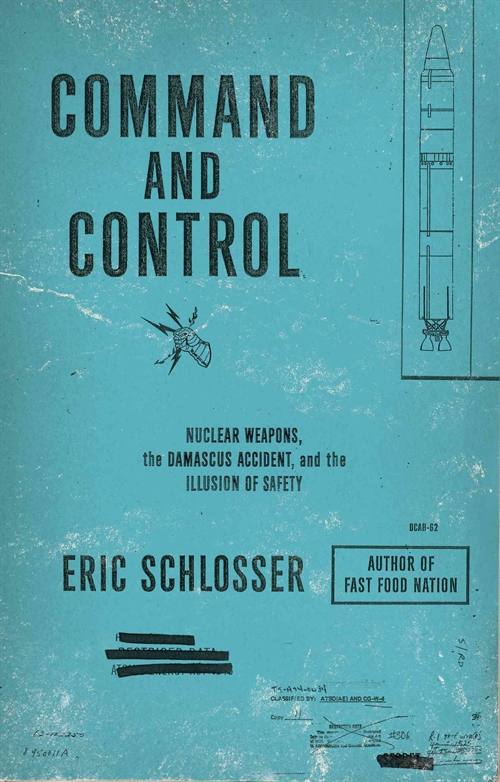Book Review: Command and Control
Eric Schlosser, 2013

This book explores, in depth, a topic that many of us don't really givee a thought about - the safety of nuclear weapons. The concept of 'safe' nuclear weapons sounds like an oxymoron - after all, these are weapons designed to kill thousands, or even millions of people. But because nuclear wars are rare, and nuclear weapons are common, people are more likely to die from an accidental detonation - eg. from a bomb going off in a plane crash, than through a deliberate use of nuclear weapons.
This book provides a history of American nuclear weapon accidents - and explores one case in particular, that of a Titan II ICBM with a hydrogen bomb payload that accidentally exploded in its silo, thankfully without triggering the nuclear fusion weapon it carried.
The book details several accidents and near misses, ranging from accidents with unreliable missiles with 4 megaton warheads, to crash after crash of bombers carrying hydrogen bombs, often scattering bombs all over the countryside, thankfully without detonating them - in several cases thanks to sheer luck and not at all due to the flimsy and unreliable safety features on the weapons themselves. In one case, a bomber flying over North Carolina in 1958 dropped its bomb when its captain grabbed the bomb release lever by accident - the bomb in question was a nuclear weapon and it landed in the backyard of a house, and did not detonate - perhaps the only case of the United States being bombed during the cold war.
Weapon safety was often an afterthought - Hollywood movies often tell a tale of nuclear weapons that can only be launched after entering a security code, and one would assume that these weapons are carefully guarded and tracked by the military. The reality is that for much of the cold war, security and safeguards were severely lacking.
During the cold war, thermonuclear weapons would be stored in overseas bases often guarded by a single soldier, missiles that only require the flick of a switch to launch. Nuclear weapons also did not have any consistent tracking system. And US mainland based ICBMs were often being secured with weak electronic safeguards where random electricity fluctuations could launch 50 Minuteman missiles each carrying 1 Megaton warheads - missiles which were designed to wipe out 150 cities and 30 % of the population of the Soviet Union.
Cruise missiles with nuclear warheads were stored in bunkers side-by-side with training missiles with dummy warheads, verification checklists were routinely ignored to save time, and appalling safety procedures were the norm. There was a very poor safety culture at the Strategic Air Command - with the SAC often fighting to implement safety features for fear of ceding authority over weapons and even to save costs - all but the most major nuclear weapon accidents (which couldn't be easily covered up) were routinely omitted from safety records for fear of attracting greater oversight.
Once started, I found the book hard to put down - Schlosser does an excellent job of storytelling, weaving in the narrative of the Damascus incident along with the background of the cold war. He does an excellent job of providing context for many of the more seemingly stupid command and control decisions made during the war. Sometimes the comprehensiveness of the book works against it though, there is definitely a great deal to take in and reading about yet another near-miss with a nuclear weapon gets boring after you've read about several such accidents already.
This is a must read for anyone who enjoys the movie Dr. Strangelove, anyone who builds things, particularly complicated things, and anyone interested in the Cold War and its history. In addition, this leaves you with an appreciation of how seemingly random the behaviour of complicated systems can sometimes be and how to design security and safeguards for such complex systems. Having finished this book, one gains an appreciation for just how lucky we are as a people - the fact that we haven't destroyed the planet with these weapons is very much attributable to blind luck.